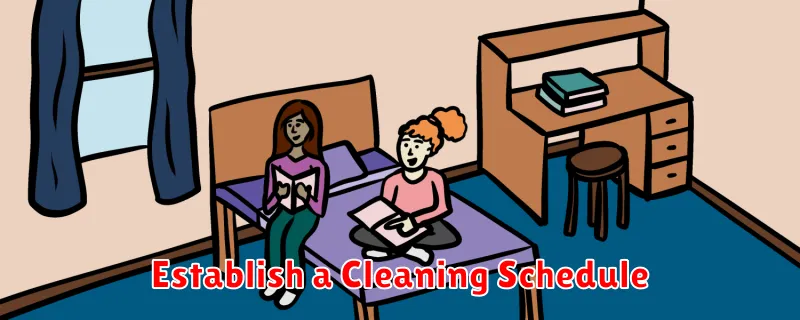Sharing a rental property can be a fantastic way to save money and enjoy companionship. However, even with the best intentions, roommate conflicts are sometimes inevitable. Disagreements can arise from a variety of issues, including cleanliness, noise levels, shared expenses, guests, and personal boundaries. Learning how to handle roommate conflicts effectively is crucial for maintaining a positive living environment and preserving your sanity. This article will provide valuable strategies for conflict resolution in shared living spaces, addressing common rental disagreements and offering practical advice on how to navigate these challenging situations.
Roommate disputes can quickly escalate and create a tense atmosphere in your home. Ignoring problems will not make them disappear; in fact, it often exacerbates the situation. Whether you’re experiencing minor disagreements or major conflicts with your roommate, taking proactive steps to address the issues is essential. This guide will equip you with the tools and techniques needed to resolve roommate conflicts constructively, fostering healthy communication and promoting a harmonious living environment. From establishing clear expectations and boundaries to engaging in productive conversations, you will learn how to manage roommate problems effectively and maintain a positive rental experience.
Discuss Expectations Early
One of the most effective ways to prevent roommate conflicts is to establish clear expectations from the outset. Before moving in together, have an open and honest conversation about your respective lifestyles.
Discuss topics such as cleanliness, guests, noise levels, shared expenses, and general house rules. This proactive approach can help to identify potential incompatibilities early on and avoid future disagreements. It’s important to be respectful of each other’s preferences and to find common ground.
Set Clear Responsibilities
One of the most effective ways to prevent conflicts is to establish clear responsibilities from the outset. This means having an open and honest discussion about who will handle which chores, how bills will be paid, and what the expectations are regarding shared spaces.
Consider creating a written agreement or roommate contract. This document can outline each roommate’s responsibilities, including cleaning schedules, grocery shopping arrangements, and guest policies. A written agreement provides a point of reference if disagreements arise later, making it easier to address issues objectively.
Use a Written Agreement
A written roommate agreement is a critical tool for preventing and resolving conflicts. It acts as a single source of truth regarding shared responsibilities and expectations.
Outline details like how bills will be split, guest policies, cleaning schedules, quiet hours, and shared grocery arrangements. This document helps establish clear boundaries from the outset, minimizing potential misunderstandings.
Ensure everyone involved reviews and signs the agreement before moving in together. This formalizes the agreement and makes everyone accountable for upholding the agreed-upon terms.
Review and update the agreement periodically, or as needed, to address any evolving circumstances or new concerns.
Respect Shared Spaces
Shared spaces are the common areas within your rental that everyone uses. These areas often become the source of conflict if not treated with respect. Think of the kitchen, living room, and bathroom. Keeping these areas clean and organized benefits everyone.
Establish clear expectations early on. Discuss cleanliness standards, noise levels, and guest policies. A written agreement can help avoid misunderstandings. If a roommate is not respecting shared spaces, address the issue promptly and respectfully.
Establish a Cleaning Schedule

A primary source of conflict among roommates stems from cleanliness discrepancies. Creating a cleaning schedule offers a structured and equitable solution. This schedule should clearly outline who is responsible for which chores and when.
Consider rotating responsibilities weekly or monthly to ensure fairness. Include specific tasks, such as taking out the trash, cleaning the bathroom, vacuuming, and kitchen maintenance. A well-defined schedule helps manage expectations and promotes a harmonious living environment.
Communicate Regularly
Open and honest communication is the most crucial element in preventing and resolving roommate conflicts. Establish clear communication channels from the start.
Regular house meetings can be beneficial. These don’t need to be formal, but they provide a dedicated time to discuss shared responsibilities, house rules, and any potential issues.
Address concerns promptly. Don’t let small annoyances fester and grow into larger problems. Respectful, direct communication is key to maintaining a positive living environment.
Handle Noise and Guests Respectfully
Noise complaints are a common source of friction. Establish clear, respectful communication about acceptable noise levels and quiet hours. Using headphones, especially during late nights or early mornings, demonstrates consideration.
Regarding guests, open communication is key. Discuss having guests over beforehand, including the frequency and duration of their visits. This helps avoid surprises and maintain a comfortable living environment for everyone.
Use Mediation if Needed
If direct communication doesn’t resolve the conflict, consider mediation. A neutral third party can help facilitate a productive conversation and guide you towards a mutually agreeable solution.
Mediation can be especially helpful when strong emotions are involved or when communication has completely broken down. The mediator’s role is to help both roommates clearly express their concerns and collaboratively develop solutions.
Check your lease agreement. Some leases stipulate mediation as a required step before pursuing further action.
Know Lease Terms on Roommates
Understanding your lease agreement is crucial for navigating roommate conflicts. Your lease dictates the legal responsibilities and obligations of each tenant, including those related to rent payments, property damage, and guest policies.
Carefully review the section addressing roommates. It should specify who is named on the lease. If only one person is named, they bear the ultimate responsibility for the entire rent and compliance with lease terms. If all roommates are signatories, they share equal responsibility.
Pay attention to the lease’s provisions for adding or removing roommates. There may be specific procedures and potential fees involved. Understanding these terms in advance can prevent disputes and financial surprises later on.
When to Consider Moving Out

While conflict is a normal part of any shared living situation, sometimes it reaches a point where moving out is the healthiest option. Consider moving out if the conflict significantly impacts your mental or physical well-being, despite attempts at resolution. This includes situations involving:
- Safety concerns: If you feel threatened or unsafe in your home due to your roommate’s behavior.
- Consistent disrespect: When your roommate repeatedly disregards your boundaries or shows a lack of respect for your personal space and belongings.
- Breach of contract: If your roommate violates the terms of your lease agreement, putting your housing at risk.
- Failed mediation: If all attempts to communicate and resolve the issues through discussion or mediation have proven unsuccessful.

